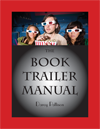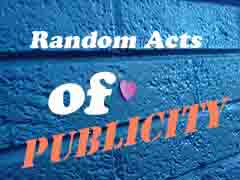Random Acts of Publicity DISCOUNT:

$10 OFF The Book Trailer Manual.
Use discount code: RAP2011
http://booktrailermanual.com/manual
Guest post by Dana Lynn Smith of The Savvy Book Marketer

 One of the most effective ways to help out an author is to write an endorsement, testimonial or review for their book. Here’s a brief description of each:
One of the most effective ways to help out an author is to write an endorsement, testimonial or review for their book. Here’s a brief description of each:
- Authors usually request endorsements (recommendations) from key influencers in their field or genre prior to publication and use these on the book cover, inside the book and on promotional materials.
- Testimonials are words of praise from readers who enjoyed a book and want to recommend it to others.
- Reviews are a little longer than testimonials and usually include more information about the content of the book and what the reviewer liked (or disliked) about it. Reviews can come from readers, colleagues, or professional book reviewers.
You can post your testimonials or reviews in online bookstores, on virtual reader communities like Goodreads and LibraryThing, or on your own blog if the book’s topic is a good fit for your audience. You can also post brief testimonials on social sites like Facebook and Twitter.
It’s important for reviews to sound authentic. One way to do that is to mention something specific that you liked about the book, or share a tip from a nonfiction book. If you are not sure quite what to say when writing a book review, study some good reviews for similar types of books and read this helpful article about how to write a book review by Nick Daws.
In addition to helping the authors of the books you review, you can gain exposure for yourself and your own books by doing reviews of books that appeal to your target audience. Novelists can review books in the same genre as their own, and nonfiction authors can review books that are similar, but not direct competitors of their own books. Here are some benefits of doing book reviews:
- Authors may promote your review on their social networks or blog, giving you exposure, or agree to review your book in return.
- Posting reviews on online bookstores like Amazon gives you visibility directly where people are shopping for books similar to yours.
- A book review that has been keyword optimized may attract visitors to your blog through online searches.
- You can even earn money from your book reviews by signing up for the author’s affiliate program (if they have one) or joining the Amazon Associates affiliate program.
When reviewing books, it’s important to avoid the appearance of being overtly promotional,
Add a Comment



